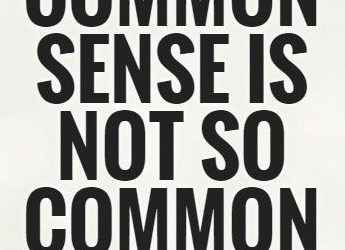
Bill Coplin, a professor of public policy at the Maxwell School and The College of Arts and Sciences of Syracuse University, and author of “Ten Things Employers Want You to Learn in College” (Ten Speed Press, 2003) first contributed this article to College Parents of America in 2005.
We are sharing it as a reminder for college families regarding the common sense that is required when selecting and attending a college or university. 
It is good to recall that common sense is not so common.
________________________________
A Texas prison inmate wrote me recently asking for a free copy of my book after reading about it in a newspaper column on the importance of soft skills in the job hunt. He justified the request with a claim that he achieved a 3.7 GPA in getting his associate’s degree and “acquired a lot of academic knowledge” but was not ready for the workforce when he completes his prison term soon. I hear this comment frequently from college graduates and current students everywhere from community college to the Ivies, and none of them are in jail.
It reminded me of what a professor said to me 40 years ago with respect to my doctorate, “A college degree and a dollar will get you four quarters.”
This statement seems counter-intuitive given the fact that people with an undergraduate degree make twice as much over their lifetime as people with only a high school degree ($2.1 million versus $1.2 million). But it is not.
In 20015, less than 30 percent of Americans over the age of 25 have a bachelor’s degree. Many of them are doing just fine. Plenty of cabdrivers have their bachelor’s, master’s or doctoral degrees. More than 60 percent of college graduates end up living at home for at least a year. Moreover, economists report that the gap between wages earned between undergraduate degree holders and those who have no degree college degree has reached a plateau.
The key to career success is to have a strong work ethic and the skills employers want: oral and written communication, people, research, computer application, number crunching, analytical and problem-solving skills. Employers rank “work ethic” the highest because all the skills and knowledge in the world will be of no use without hard work and continuous self-improvement.
Will a college education help students develop the skills they need for rewarding job opportunities? Employers and researchers answer, “not exactly.” A survey of 450 employers in 2004 by Duffey Communications reports that only 20 percent of the respondents said yes when asked. “Are schools preparing students to meet employers’ needs?”
Employers tell me they have a difficult time finding applicants with these skills. A high-level manager in a major telecommunications company e-mailed me the following: “Most kids coming straight from college to the work world do not have many (if any) of these skills at the very basic level, let alone mastered.”
Reports by the Business-Higher Education Forum in 1999, and again in 2003, refer to a “skills deficit” in “leadership, teamwork problem solving and communications.” Employers know that the academic program and performance of students is a poor indicator when compared to their student activities, internships and jobs. The winning employees are not necessarily those who get the degree and obtain a high GPA. Those who put themselves and excel in challenging situations outside of the classroom are a much better gamble.
Tim Russert in his book “Big Russ & Me” writes, “I majored in political science and received a good education, but when I think about my college days, it’s the extracurricular activities that I remember most vividly.” He became president of U-Club, which brought speakers and entertainers to his college, and he served as president of the student government during early 1970s. I am sure he found the consequences of his business and political decisions to be far more powerful in skill-building than the judgment of faculty members.
Lessons for the workforce are best learned when people are forced to make decisions that directly affects them. One of the most powerful activities a college student can undertake, for example, is to become a Resident Adviser. These sophomores and juniors have survived the twin challenges of unruly freshman and a university bureaucracy. College provides the opportunity to build the skills employers want and a job-winning resume. What counts most is careful planning early in one’s college career leading to part-time or summer jobs, internships and leadership positions on campus during the last two years of college.
Many colleges increasingly give college credit for these kinds of experiences through project-based, internship and field-work courses. Semesters away from campus, especially overseas and with an internship requirement, are valuable because students must sink or swim in an unfamiliar setting.
However, the majority of college faculties are not on board. They remain reluctant to give credit for skill developing experiences. They see their role as transmitting knowledge and assume applied activities are an unnecessary distraction. But distraction is in the eye of the learner. Students who use college to develop their professional skills and character should focus on reality and not appearances.



